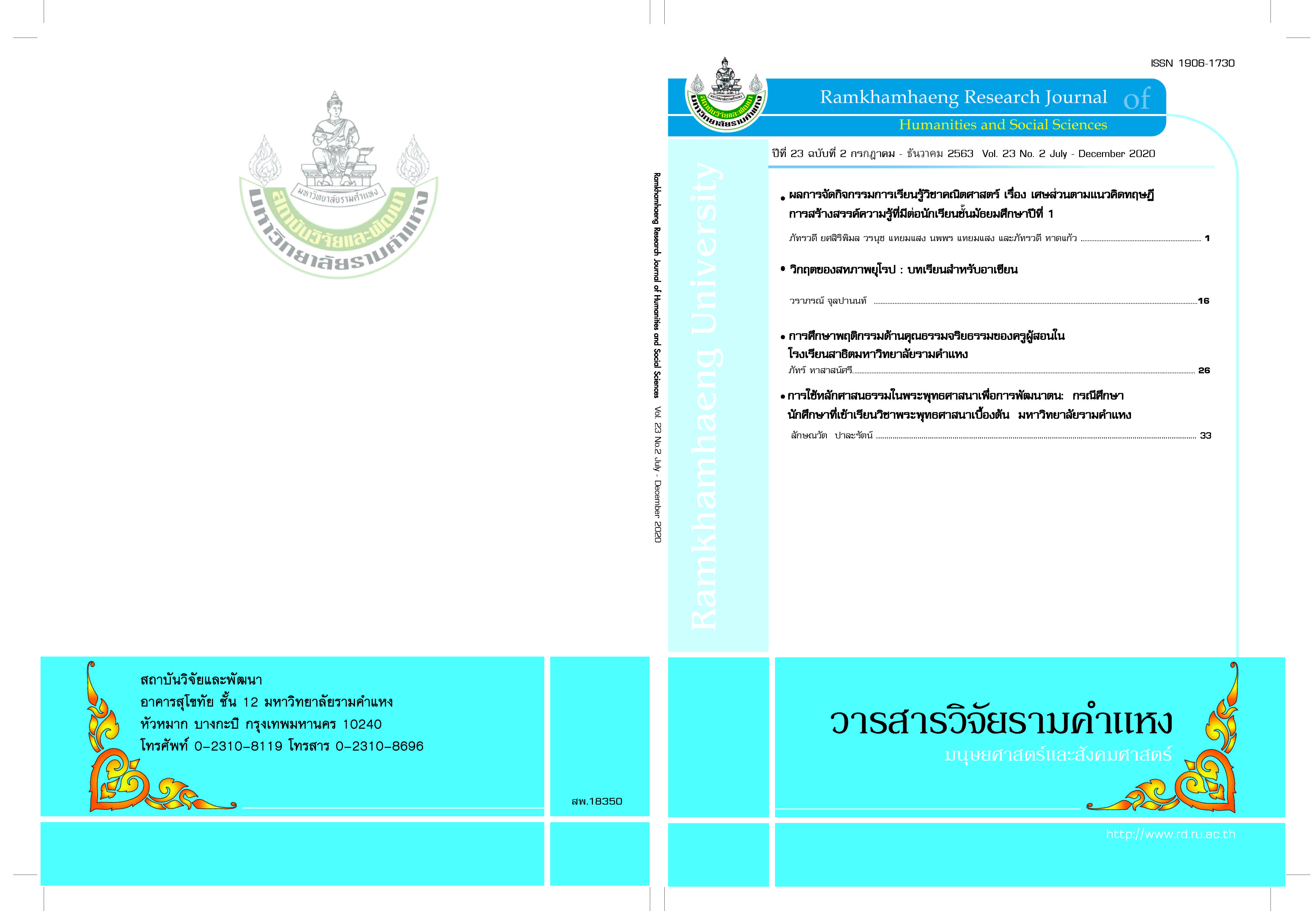The Application of Buddhist Teaching for Self - Development : A Case Study of the Students Attending the “Introduction to Buddhism” Course, Ramkhamhaeng University
Main Article Content
Abstract
The aims of this research were to explore the Buddhist teachings on self - development and to search for the promising method to be used for the application of the Buddhist principle for self – development of 100 student attending the “Introduction to Buddhism” course at Ramkhamhaeng University. It also aimed to study the results of such application for self – development, both in body - development, mind - development, and the quality of life. According to the documentary research, it was found that “Puññakiriyāvatthu” consisting of Dānā, Sīla and Bhāvana is the suitable principle to be applied for self - development training of the participants. As for the method, it is found that Dr. Maxwell Maltz’s idea on adjustment period to changes and new behaviors known as “21 - Day Habit Theory”, that any action done repeatedly and continuously for a minimum of about 21 days tend to form “habit”, is promising to be used in setting the timelines for the practice of “Puññakiriyāvatthu” to make a sustainable self - development. According to the field research, it was found that “Puññakiriyāvatthu” is the principle that everyone in the practice group viewed it as being practicable and habitual in daily life. They also found it effective both in body - development, mind - development, and in improving the quality of life. In regard to the changes or development in behaviour, characters, thought and mind, most of the student viewed it at the high level, while some viewed it at the highest level, and only few and very few viewed it at the moderate and low level respectively. Considering the four desired virtues of “The Thai 4.0”, it can be said that the practice of “Puññakiriyāvatthu” can develop such moral characters: the practice of Dānā or giving , sharing, sacrificing, helped to develop the two virtues: living in moderation or sufficiency and public mind. While Sīla, doing no harm to others, helped to develop the other two virtues, i.e. self - discipline in living in conformity to law and morality, and responsibility for oneself and others. Lastly, the practice of Bhāvanā or mental culture developed the mind, and enhanced “Pañña”, the wisdom in understanding the true nature of life and all things which enabling one to act properly and therefore free from sufferings.
Article Details
ใส่ข้อความกอปปี้ไรท์
References
เทอดศักดิ์ เดชคง. 2545. ความฉลาดทางอารมณ์. พิมพ์ครั้งที่ 14. กรุงเทพมหานคร: สำนักพิมพ์มติชน.
ปณิธิ พุทธกรุณา. บรรณาธิการ. ม.ป.ป. พัฒนาอารมณ์ พัฒนาสติปัญญา ศักยภาพของ IQ และ EQ. กรุงเทพมหานคร: ทัพอักษรการพิมพ์.
พระไตรปิฎกและอรรถกถาภาษาไทย ฉบับครบรอบสองร้อยปีแห่งราชวงศ์จักรี. 2525. เล่มที่ 37. กรุงเทพฯ: โรงพิมพ์ มหามกุฏราชวิทยาลัย.
วีรวงศ์ (พิมพ์ ธมฺมธโร), สมเด็จพระมหา. 2527. บทสร้างนิสัย. กรุงเทพมหานคร: องค์การค้าของคุรุสภา.
ศันสนีย์ ฉัตรคุปต์. 2544. บุคลิกภาพที่ดีกับระดับอีคิวของเด็ก ใน ผานิต บุญมาก (บรรณาธิการ). ไอคิวและอีคิวประตูสู่ความสำเร็จของลูก (หน้า 9 - 15). กรุงเทพมหานคร: แปลนพริ้นติ้ง.
สมภพ โชติปัญโญ. พระ. 2559. บุญ ทาน น่าอัศจรรย์จริง. กรุงเทพ: หจก. แอลซีพี ฐิติพรการพิมพ์.
สำนักงานคณะกรรมการพัฒนาการเศรษฐกิจและสังคมแห่งชาติ สำนักนายกรัฐมนตรี. 2560. แผนพัฒนาเศรษฐกิจและสังคมแห่งชาติ ฉบับที่สิบสอง พ.ศ. 2560 - 2564. กรุงเทพมหานคร: โรงพิมพ์สำนักนายกรัฐมนตรี.
Clear, J. 1980. “ How long does it actually take to form a new habit? ” Retrieved from http://jamesclear.com/new-habit.
Maltz, Maxwell. 1960. Psycho - Cybernetics.
New York: Essandess Special Edition.


